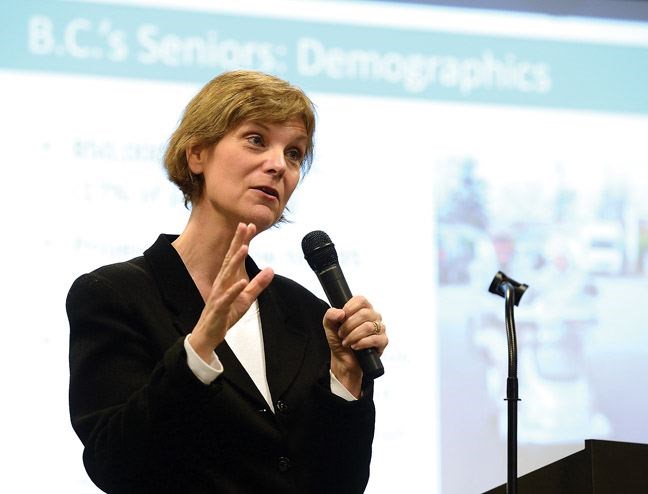Prince George is significantly higher than the B.C. average when it comes to placing people into residential care homes earlier than they need to be, said the BC Seniors Advocate, Isobel Mackenzie during a town hall meeting held at the downtown branch of the library on Tuesday.
"We did a big report on housing and found there needs to be a fundamental redesign of registered assisted living and this is something people in Prince George should - I hope - welcome because in fact the government did work on that and did pass legislation," said Mackenzie, who spoke to an audience of about 50 people. "We found people were being moved out of assisted living prematurely and into residential care. We did a report where about 15 per cent of people in residential care in the province didn't need to be there based on their health assessment. In Northern Health it's actually 25 per cent. You've got more people in Northern Health in residential care that don't need to be there."
The reason for that is the lack of assisted living facilities and the lack of home care support, she added.
There was health assessments done on 27,000 people in residential care in B.C. to discover those who didn't need to be there, said Mackenzie.
The report also found overuse of medications. In B.C. eight per cent of the population in residential care are diagnosed with a psychotic disorder that requires the use of an anti psychotic that addresses issues like schizophrenia, bipolar and those that have had a psychotic episode, said Mackenzie.
"The use of an anti-psychotic - a powerful, powerful drug - is important - if you need it, you need it - 33 per cent of the residents are prescribed an anti-psychotic drug in residential care facilities," said Mackenzie. "And this gap is what we need to have a conversation about. The issue is using those drugs inappropriately for alternative purposes."
As a member of the public, Mackenzie said, people are exercising free choice by filling a prescription and taking the medication but in residential care the resident does not have that choice.
"And that's problem number one," said Mackenzie.
There's also issues with the number of people prescribed anti-depressants.
"So a quarter of our people in residential care are diagnosed with clinical depression but half are on anti-depressants," said Mackenzie. "Part of this is the perception that we're happy all the time. So if someone was a miserable old sod all their life where they didn't like people, people didn't like them and now they're living with other people all the time it's not perhaps unreasonable that they're unhappy. We demand conformity of behaviour and we demand conformity of experience and engagement in the facilities."
People are not the same within the community and they won't all be the same in residential care, she added.
Other issues addressed during the town hall meeting were things like looking at seeking Medical Services Plan assistance for dental, vision and hearing care for low income seniors but that's a long range plan as she is in conversations with the government about it, Mackenzie said.
Caregiver respite was also addressed in various forms like adult day cares that offer six or seven hours a day respite, ideally three times a week, respite for a week or more at a time for those caregivers in distress and those that simply need additional care in the home.
Transportation for seniors was also an issue discussed whether it was a Handy Dart service, taxi savers coupons or bus passes.
During the meeting, audience members took the time to tell Mackenzie her office has been doing some good work.
Mackenzie said she'll be back in Prince George in June to talk to the hospital about seniors getting out of the hospital when they should -- not too early and not too late -- and how that looks for the supports at home.
Those wishing to reach out to the BC Seniors Advocate can call 1-877-952-3181 or visit www.seniorsadvocatebc.ca.



